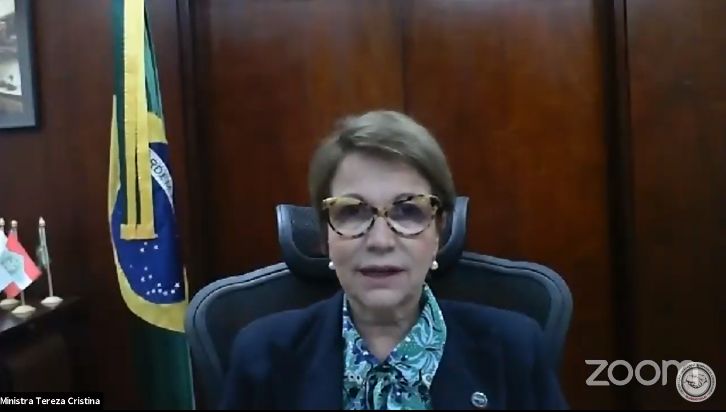São Paulo – Brazil’s is poised to increase its foothold as a halal food supplier once the pandemic is over, Agriculture, Livestock and Supply minister Tereza Cristina during a webinar hosted by certifier Fambras Halal this Wednesday morning (17). The topic of the webinar was the importance of Brazilian halal foods to the world. Arab Brazilian Chamber of Commerce president Rubens Hannun agreed. According to him, Covid-19 is prompting people to shop for quality and cleanliness, and halal foods provide both.
Tereza Cristina believes that both the Ministry of Agriculture and the Brazilian productive sector are well prepared to keep supplying food to the world. “Our country has a vocation of being a major supplier of safe, quality food to the world. And this vocation certainly also applies to halal goods. Once the crisis is over, I believe traditional partners will be valued, and I believe Brazil will strengthen its position as a reliable partner that prioritizes long-term relationships. Thus, I hope that after the pandemic, solid relations between our countries will grow even bigger and stronger,” she said.
Hannun said non-Islamic countries which import halal items offer multiple opportunities to Brazil. “Especially now, with the coronavirus, as we see consumers maturing fast. They are seeking quality, hygiene and care, and these are halal values that are not religion-specific; they are more like a lifestyle. So non-Islamic countries and non-Islamic shoppers can also embrace halal, and this can lead to diversification and stronger sales of higher value-added product,” he argued.

Hannun remarked that the Arab Chamber has put in place an in-house strategic trade committee to find new suppliers in Brazil that can cater to the needs of Arab countries. “Right now we have 24 entities aboard our committee, among them the Ministry of Agriculture and Livestock, the Ministry of Economy, via Secex, Camex, and São Paulo Negócios. This goes to show that our partnership with the Arabs will continue,” he said. Secex is the Foreign Trade Secretariat of the Ministry of Economy. Camex is the Executive Secretariat to the Ministry’s Foreign Trade Chamber. SP Negócios is the investment and export promotion agency of the São Paulo municipality.
Fambras Halal president Mohamed Zoghbi said that although the Covid-19 pandemic is a global challenge, the work in Brazil hasn’t stopped. “We are still honoring our agreements with Islamic countries. This stance underscores Brazil’s ability to cater to international demand for halal products, and it translates into even more loyal clients. This is an important point. Even in troubled times in Brazil, Islamic buyers have stood by us, trusting what is produced here,” he said.
Zoghbi believes that the post-pandemic world will continue to offer great opportunities in halal products and foods, especially due to food security. “These products undergo strict processes, determined by national law as well as major national and international rules concerning halal and product safety. The process involves analysis not only of documentation and raw materials, but also of corporate conduct, of how slaughter is performed, and of how companies earmark some of their profits to social causes and the environment,” he said.
Minister Tereza Cristina also said she expects trade barriers which were lifted amid the pandemic will remain so in the aftermath. “We had a few trade barriers lifted during the pandemic. My concern now is whether this will be a temporary emergency measure that will last only while the public health crisis is taking place. I hope these positions will remain in the post-pandemic,” she said.
She also said she’s worried about an escalation of agricultural protectionism after Covid-19 has blown over. “Anyway, the scenario is a very complex one, and it may be a while before we can fully grasp the impacts of this pandemic,” she said.
Speakers in the webinar also included the Brazilian Ministry of Economy’s joint secretary for Foreign Trade and International Affairs, Yana Dumaresq; congressman Alceu Moreira, who chairs the Parliamentary Front for Agriculture; and Brazilian Food Industry Association board chair Grazielle Parenti, all of whom discussed the halal market and the potential for an increase in halal exports.
The webinar was moderated by Arab Chamber vice president Ali Zoghbi. Minister Tereza Cristina had to leave the webinar after speaking to attend a presidential office appointment, at which point Agriculture Ministry Foreign Trade and International Relations secretary Orlando Ribeiro stepped in.
Watch the full webinar below:
Related stories:
https://anba.com.br/en/brazil-has-potential-for-diversification-in-halal-market/
https://anba.com.br/en/halal-label-stands-out-even-in-non-islamic-markets/
Translated by Gabriel Pomerancblum




